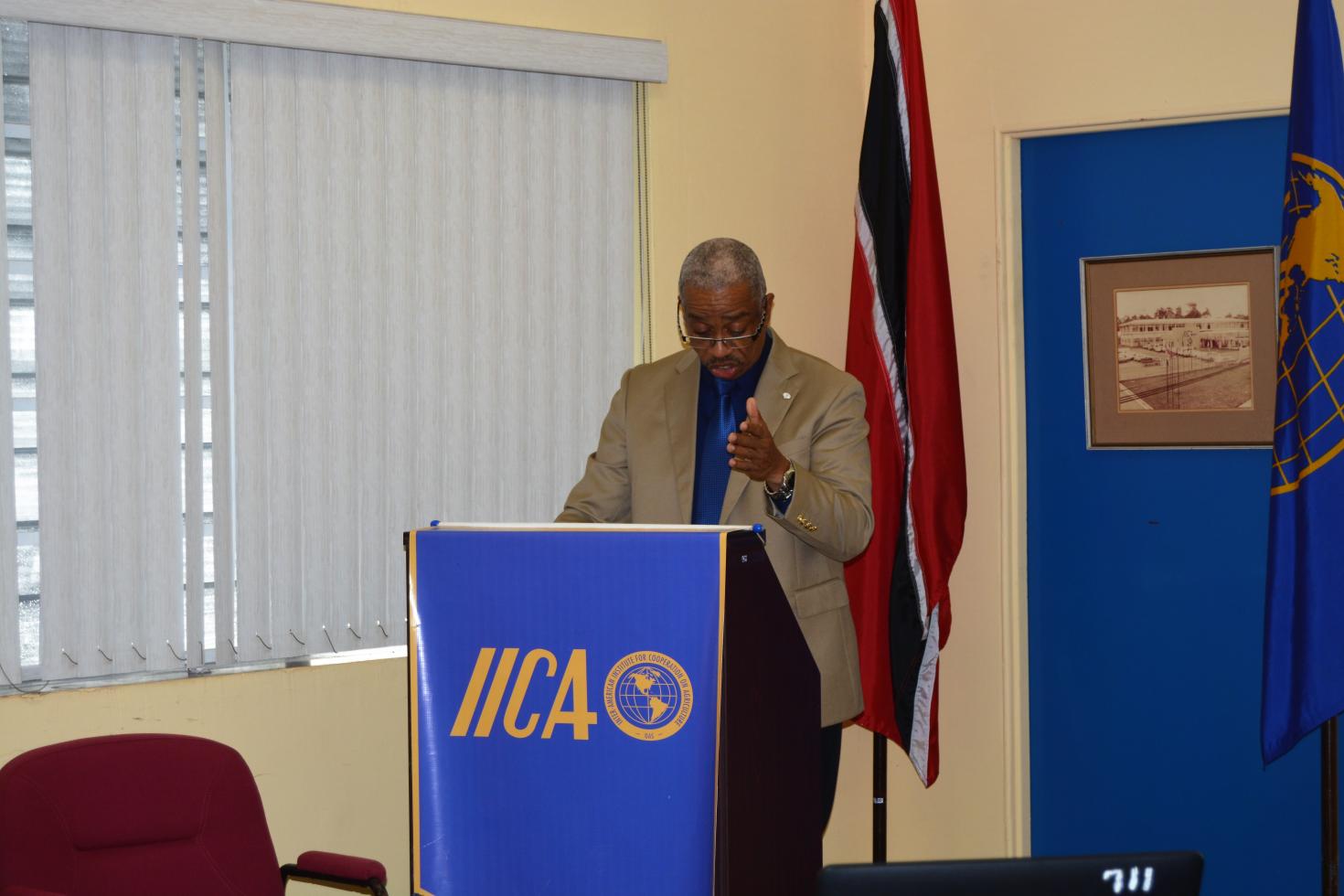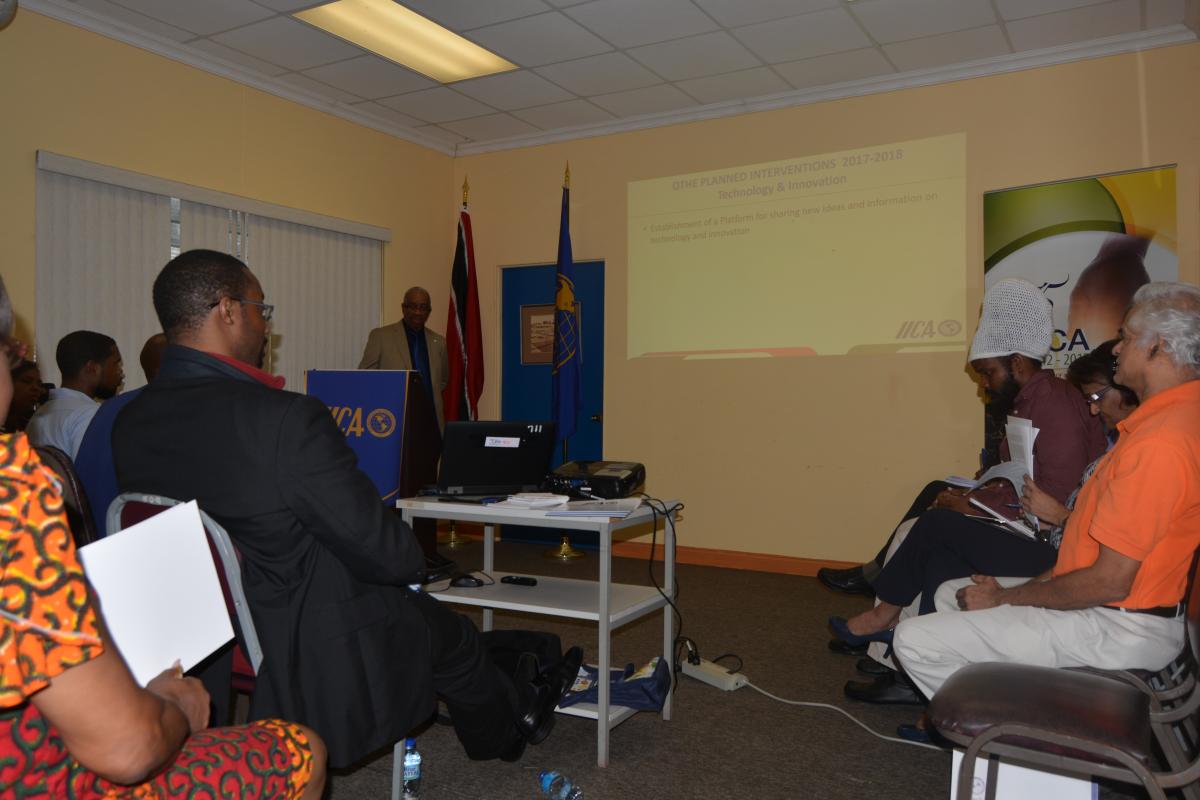Actions focused on resilience and risk management, agricultural health and food safety, productivity and competitiveness of agricultural chains and family agriculture.

Port of Spain, Trinidad, June 20, 2017. Support to the Trinidad and Tobago Goat and Sheep Society towards building sustainable development of the dairy goat sector; strengthening capacities of the Tobago Packing House; support for modernizing the Animal Health Legislation, determining the pest and disease status of the Apiculture industry; helping farmers to govern their organizations and develop strategies to mitigate climate change awareness and actions in Trinidad and Tobago, were some of the major highlights of the annual accountability seminar of the Inter-American Institute for Cooperation on Agriculture (IICA).
The IICA Representative in Trinidad and Tobago, Gregg Rawlins, recognized the commitment and hard work of all of the partners and stakeholders involved in the projects carried out by the Delegation for their invaluable support and collaborations, which made it possible for the successful implementation of many of the technical cooperation programmes.
“Accountability is at the core of good governance and all institutions and organizations, whether in the public or private sectors, should strive to establish governance mechanisms that ensure transparency, accountability, shared responsibility, equitable distribution of benefits, the flow of information and the full participation of all relevant stakeholders in key decision making”, stated the IICA Representative in Trinidad and Tobago, Gregg Rawlins.
Specific results highlighted included several capacity building activities in support of the dairy goat chainsuch as improvements to goat husbandry management, the preparation of a dairy goat business plan, a dairy goat husbandry manual and fact sheets on the production of eight different types of forages for members of the Trinidad and Tobago Goat and Sheep Farmers (TTGSS).
The TTGSS was also the beneficiary of five portable milking machines, sponsored under the 10th EDF APP programme, which also funded two model greenhouses, as well as field crates to farmers for transporting produce.

In farming agriculture, several farming groups benefitted from an internship programme in governance for improving efficiencies in their own organizations.
Actions executed in Agricultural Health and Food Safety include several national initiatives to provide support to the Government of Trinidad and Tobago under the Sanitary and phytosanitary measures (SPS) project, in addition to building of public and private sector stakeholders’ capacities on Hazard Analysis Critical Control Point (HACCP), traceability, risk analysis, and Food Safety Modernization Act (FSMA), to name a few.
In the matter of resilience and risk management, initiatives were taken to build capabilities of key institutions to prepare risk maps of vulnerable areas that are subject to flooding, as well as plans to continue the forum on Climate Smart Agriculture, to discuss issues related to adaptation and mitigation measures required as a result of climate change and its impact on the agricultural sector.
The accountability seminar also provided an opportunity for the IICA Delegation to get feedback from stakeholders, for informing the work programme for the 2017-2018 period.
The activity concluded with endorsements by participants on the work being done by IICA.
Among the invited guests were officials from public and private institutions and agencies, including various divisions of the Ministry of Agriculture, Land and Fisheries; the Ministry of Health; the Division of Food Production, Forestry and Fisheries of the Tobago House of Assembly; the Environmental Management Agency (EMA); the University of the West Indies (UWI); the Caribbean Research and Development Institute (CARDI); the National Marketing and Development Company (NAMDEVCO); the Ministry of Planning and Development, as well as an adviser from the Office of the Prime Minister and representatives from several farmer organizations.
More information:
Edric Harry, Policy Analysis and Planning Specialist
Lisa Harrynanan, Agricultural Health and Food Safety Specialist










